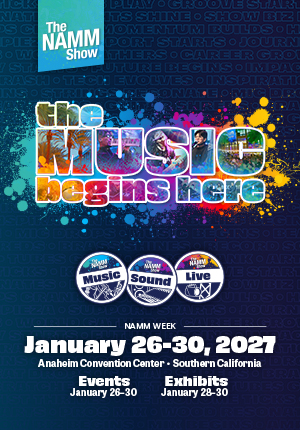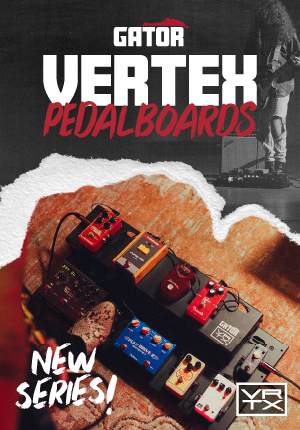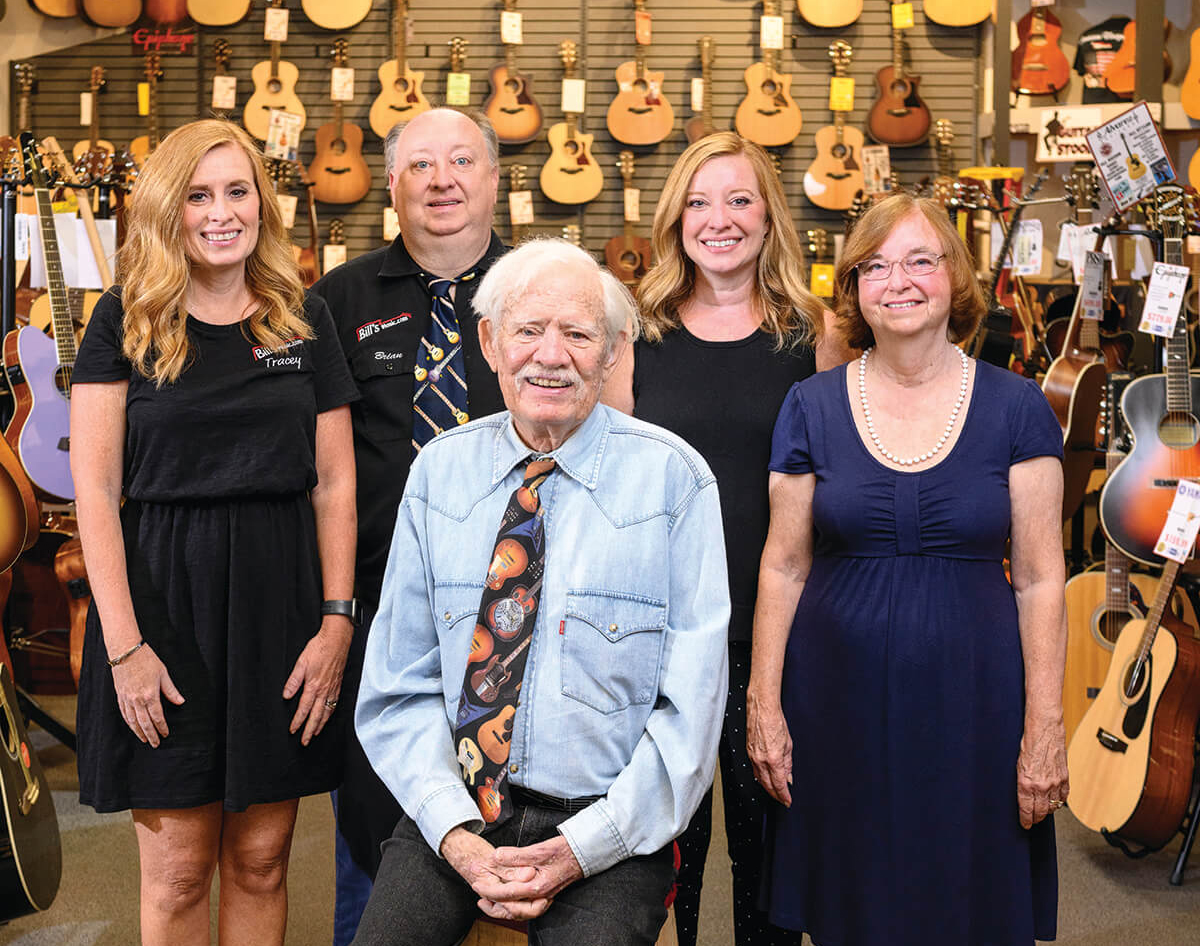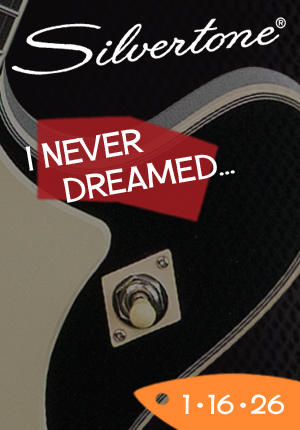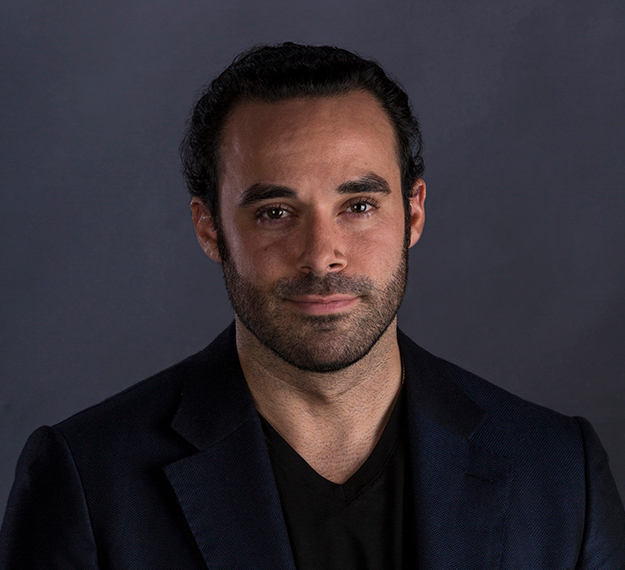
Evan Rubinson
HQ: Little Tampa, Florida
Founded: 1994
Employees: 58 full-time, roughly 70 contractors
Best selling product: The Luna Ukulele Tattoo Concert Mahogany with gigbag, Luna Ukulele High
Tide Concert Koa with preamp and gigbag, and Dean Exile Select Floyd Fluence Black Satin guitar.
Fun fact: Armadillo Enterprises was originally started by Rubinson’s father, Elliott Rubinson, to manufacture flight and tour cases. The company has since evolved to include Dean Guitars, Luna Guitars and ddrum. From ages 11 to 22, Evan Rubinson worked summers in his father’s warehouse to learn the business, later assuming leadership in December 2016.
How do you start your day?
I get up around 5:30 or 6:00 a.m. and immediately start with email, looking at anything that came in through the night. I clear my inbox for an hour and then plan my daily call list. I also edit my daily to-do list and update my long-term to-do list with things that need to be pushed back. After that, I take my three dogs out and play with them for about an hour, feed them, and then get started on meetings and the rest of the day’s business.
What’s new and exciting for you at Armadillo right now?
I’m excited about our Luna Vista acoustic series [of] guitars, which has done incredibly well. It’s a comprehensive line with depictions of deer, eagles, wolves and stallions on the instruments. They’re unique because of the different woods that go into creating the images on top of the guitars, how pretty the contrast is between the animals and the surrounding landscapes, and how the sound of the guitar shines even with multiple different types of wood on top. On the Dean side, I’m looking forward to launching the new Vengeance and Zero guitars later this year, and with ddrum, we’ll be coming out with a new electronic drum trigger interface, as well as a new signature Vinnie Paul trigger pack and drumstick bag. We’ve put a lot of time and effort into both. I think they’re going to blow people’s socks off.
How thoroughly do you get to know each product Armadillo puts out?
Armadillo has over 1,000 SKUs, so I can’t know every detail of every single product. But our core SKUs, the top 100 or 200, I try to know well, so I can speak to distributors intelligently without having to pull up a spreadsheet. It’s impactful to know enough about what you’re selling so you can adequately and honestly convince people it’s a good buy. If you’ve never played or touched what you’re selling, if you have no intimate or deep understanding of what it can do and why it’s better than a competitor’s product, you’re not going to be very effective.
How do you approach new product development?
I like to roundtable — I don’t like to be the smartest guy in the room, and I know that I don’t know more than everyone else when it comes to new products, so working together is really key. Right after Winter NAMM every year, we have a debrief meeting in early February. Our head luthiers, product managers, EVP of sales and other key stakeholders get together in a room and we discuss what everyone saw at the show. We talk about how our products stacked up, if there’s anything we’re worried about, what we need to do differently. Then, through the end of the spring, we have regular monthly meetings and brainstorm what we want to do in terms of colors, features and configurations. We finalize our core ideas regarding new products in time to go with photography and staging for our annual Armadillo All Access pre-NAMM event in December.
And it’s all a team effort?
I’m big on community verdicts. Having the core members of our team roundtable ideas is like holding a mini-focus group. Even though everyone is within the company, there are so many different musical genres, styles of play, backgrounds and perspectives represented that I always feel good about what we come up with. With so many smart and experienced people in the room together, if they all agree on something, it’s easy to make the call to move it forward.
How would you describe your management style?
I’m a perfectionist at heart, but at the same time, I love to make sure people have autonomy to work and make decisions on their own. When I start working with new employees, for the first six months I tend to be hands on, just so we can get to know each other, build trust, and have them get to know what my goals and expected results are. Once we’ve established that baseline, I like to turn autonomy over to them. For a company and brand to scale, the owner and CEO can’t micromanage each area. That sort of behavior breeds resentment and inefficiency. What I really want is for our entire team to be in lockstep and see eye to eye when it comes to goals and overall strategy, to understand where we are going and what we need to accomplish. If that understanding is there, I’m hands-off.
It sounds like you invest a lot in training your team.
I love retaining loyal, high-quality, smart people. To me, the be all and end all of running a successful business is not having to worry about learning curves and transitions. Armadillo is a close-knit, family group. Our average employee lifespan is 12 years, so there’s not a lot of turnover.
How do you approach getting your employees to stick around?
The first part is being accessible and understanding, particularly if people have issues in their lives and need flexibility from the company. Our company is a family, and a big part of employee retention is genuinely demonstrating support and caring — I can’t run Armadillo without the greater team, and they can’t do it without me. So, it’s a key priority to treat people well and make everyone know that we’re in the same boat together. Beyond that, it’s important to be fair when it comes to salary, benefits, bonuses and boundaries. I don’t call my team members at 2 a.m. when something big hits the fan — I respect their need for privacy and time off. I also try to understand everyone’s individual needs, and take the time to get to know them. A cookie-cutter approach to management has never worked for me. And purely from a productivity standpoint, if you want the best results, you get more bees with honey than vinegar.
What was it like growing up with your father running Armadillo?
I had maybe a fairly atypical exposure compared to other family-owned companies that get passed along from parents to children. My father was a self-made man, starting with the Thoroughbred Music retail company that he eventually sold to Sam Ash. When I was 14, I wanted a bass guitar and my father’s response was that it would cost me three hundred hours of work in the warehouse to earn the instrument. So I swept floors, broke down boxes, unloaded trucks, processed orders. At the time, I resented it a little, but my father told me that I would respect the instrument, appreciate it and remember it more if I worked for it, and he was right. So I worked in the warehouse every summer for 11 years. In 2013, he brought me overseas on a business trip with him to every factory we had in Asia. He introduced me to people and really began training me during that trip. That was a big turning point for me.
When did you officially join the company?
Not until December of 2016. My father wanted me to learn to stand on my own two feet before bringing me in, so I decided to go into finance after college. Later, when my father started to fall ill I knew I needed to come home, step in, further the company and keep the legacy alive. My father welcomed me in at that point. He sadly passed away in 2017. Taking over leadership of the company at that point was a no brainer.
Do you expect to keep Armadillo as a family company?
I would love to pass the company on to my future children — I’m not a father yet, but I am engaged and my fiancée and I plan to start a family. To me, a company’s true legacy and level of sustainability and respect is measured by whether or not it can be multi-generational, if it can live through any artists or managers who come and go. I would love for the brand to stand the test of time, to pass it along to my children and say, “Kids, my father left Armadillo at X revenue. I left it at Y. Now it’s your turn.”
What’s your musical background?
I grew up playing bass guitar and was in a band in middle school. I transitioned more to sports and went to college on a sports scholarship, so bass went by the wayside. I picked it back up more recently and still play in my free time.
Is there anything else about Armadillo that you want Music Inc. readers to know?
A lot of people already know that our company is a tight-knit family with very minimal turnover, but what they may not know is that taking the time to build relationships, to really understand what your co-workers need and want, applies externally as well as internally. Our distributors are family, too. There’s no cookie-cutter approach to working with our dealers, and I always want to understand their individual needs and struggles. I talk to dealers directly and we are always willing to put together custom plans to get our customers what they need. At the same time that we take an individual approach, we also have the infrastructure of a big company, with distribution in nearly every country in the world, global networks, heavy-hitting artists and lots of ability to market via social media. The combination of that large-scale support structure and small-town company feel is key to who we are.
If not music, what would you be doing?
As I mentioned, before I took over with Armadillo after my father’s passing, I was working in finance, so that’s probably where I’d be.

